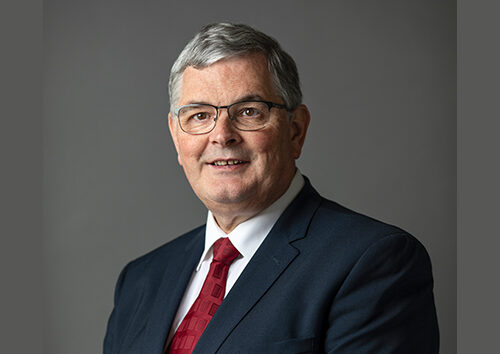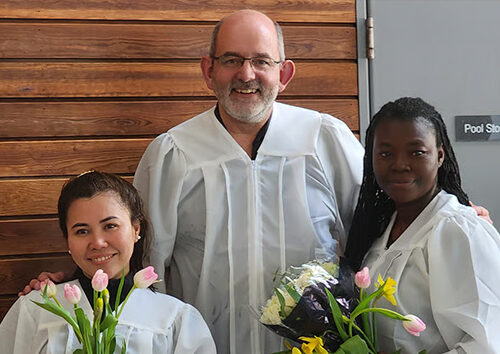9 November 2017 | Worms, Germany [Victor Hulbert with Robin Anthony] It’s easy to go with the flow, to be surrounded by people who all think the same, and to believe the same things as everyone else. It takes less effort. Why be the salmon swimming upstream, when it’s easier to be the twig floating down? Once, people were born, lived, and died under a belief system that told them what to think and how to think it. It told them what to do, and how to behave. It created a social and cultural environment in which everyone knew what was going on.
 The Reformation shattered that universal certainty. Now you had to make a life altering choice. Do you stay within your community and maintain your identity, or do you trade it all in for an unknown?
The Reformation shattered that universal certainty. Now you had to make a life altering choice. Do you stay within your community and maintain your identity, or do you trade it all in for an unknown?
“It involved embracing novelty in an era that despised and distrusted innovation, and validated all change by its compatibility with the inherited wisdom, custom and teaching of the ages.”1 If you got it wrong, it meant that you had thrown away your eternal life in heaven, for a much more uncomfortable one in hell.
https://www.youtube.com/watch?v=GcSkmz3b9P8
At the root of the word ‘heretic’ is a Greek word meaning ‘choice’, and that is what being a heretic means – making a choice – normally against another choice, and this is what the Reformation brought to Early Modern Europe. It forced you to choose in a world that previously didn’t have choices, and these had long-term and life-changing consequences for your work, your family, where you could live, and what you could believe. Protestants had to forge and form completely new communities, worship styles, and new social structures. Once the Reformation genie was out of the bottle, there was no way of putting it back – there were now options in the world, and while many chose to remain with what they found intellectually, socially, or religiously comfortable, many people didn’t.
 How do you know which version of Christianity is true? How do you make a choice when two immovable ideas meet each other? That was the “Here I stand, I can do no other” choice for Luther in Worms, and eventually, for many, the ease of making a choice based on conscience and the study of Scripture was made easier as communities were established in more independent places such as parts of modern day Germany and Switzerland.
How do you know which version of Christianity is true? How do you make a choice when two immovable ideas meet each other? That was the “Here I stand, I can do no other” choice for Luther in Worms, and eventually, for many, the ease of making a choice based on conscience and the study of Scripture was made easier as communities were established in more independent places such as parts of modern day Germany and Switzerland.
 When, in 1521, Martin Luther rode into Worms in the back of a cart, 2,000 people were there to cheer him on. He had the popular vote. However, already excommunicated by Pope Leo X, his full expectation was, that when he faced the Emperor, Charles V, the vote would go the other way, and he would face death.
When, in 1521, Martin Luther rode into Worms in the back of a cart, 2,000 people were there to cheer him on. He had the popular vote. However, already excommunicated by Pope Leo X, his full expectation was, that when he faced the Emperor, Charles V, the vote would go the other way, and he would face death.
 “It was the most challenging phase of his whole life,” states Rolf Pöhler, professor of Systematic Theology at Friedensau Adventist University, Germany. In part six of Reformation Journey, he states, “nailing the thesis was one thing, you can do this in the night or the day, but facing all the authorities of the world, of the Church, alone, with some friends who can’t really help you, this was the biggest struggle of his life.”
“It was the most challenging phase of his whole life,” states Rolf Pöhler, professor of Systematic Theology at Friedensau Adventist University, Germany. In part six of Reformation Journey, he states, “nailing the thesis was one thing, you can do this in the night or the day, but facing all the authorities of the world, of the Church, alone, with some friends who can’t really help you, this was the biggest struggle of his life.”
Even though Luther had proposed his thesis three years earlier, and his message of faith and grace had gained ground in many places, he was still scared as he appeared before the emperor. In fact, Pöhler describes, he got “wobbly knees” and pleaded for more time to think things through.
The emperor gives him one final night, a time that could be described as his ‘Gethsemane’ or ‘dark night of the soul’.
 “Should I confess? Should I renounce? Do I have the courage to stand against the whole world and against the Emperor?” Luther spent the night rethinking; reviewing his experience.
“Should I confess? Should I renounce? Do I have the courage to stand against the whole world and against the Emperor?” Luther spent the night rethinking; reviewing his experience.
That gives him the courage the next day for his three-pronged attack. He follows his conscience but notes that “my conscience is found in the Word of God.”
Standing in Worms at the very spot where Luther defended himself, Pöhler noted that Scripture is the foundation of Luther’s faith, but that there is also one more important part. “Conscience based on Scripture must be combined with sound reasoning, because you have to argue me out of my writings if you want to convince me I’m wrong.”
“That is the big shoes in which Luther stands,” Pöhler says: conscience, Scripture and reason. He challenges, “Everyone can stand in those shoes.”
Those three things: conscience, Scripture and reason need to be fully alive in the Christian’s life today. Lose one part and it is possible to lose everything.
 Celebrating 500 years of Reformation history, we still need to apply those principles to today – and add to them tolerance, the ability to disagree, to hold closely to what I believe, but to reason with compassion, and with intellect.
Celebrating 500 years of Reformation history, we still need to apply those principles to today – and add to them tolerance, the ability to disagree, to hold closely to what I believe, but to reason with compassion, and with intellect.
The reformation is not just dead history. It encourages us to value the Holy Scriptures in our own language, that God’s Word can be accessible and understandable, and something not to be taken for granted. It emboldens us to ‘stand for right though the heavens fall’2 when our biblical world view may clash with values held within modern society and culture. It gives us hope that truth will triumph, and it leaves each one of us with the question of choice, “Do I take the easy option – or the right option.” [tedNEWS]
———————————————
1 Pettegree, Andrew, Reformation and the Culture of Persuasion (Cambridge University Press, 2005), p.1
2 Ellen G While, Education, p 57
tedNEWS Staff: Victor Hulbert, editor; Deana Stojkovic, associate editor
119 St Peter’s Street, St Albans, Herts, AL1 3EY, England
E-mail: [email protected]
Website: www.ted.adventist.org
tedNEWS is an information bulletin issued by the communication department of the Seventh-day Adventist Church in the Trans-European Division.



